Pure and unrefined coconut oil is completely natural and organic product that can benefit your overall health, help to beautify and make dishes that truly represent useful food. Coconut oil, along with cocoa butter and olive oil is one of the leading beneficial fat providers. In certain places, the use of coconut oil is not massive, but you can generally find this product easily. However, we should not confuse coconut oil with palm oil or vegetable oil.
As you may have guessed, coconut oil is extracted from coconuts. The most valuable and useful unrefined oil is obtained by the method of cold pressing of the already dried coconut kernel. The structure of coconut oil is solid up to 25 degrees. With temperatures below 25 degrees the coconut oil in solid form, but then begins to melt. Therefore, put it on your skin and as it melts, it is fully absorbed.
Its color is white to pale yellow and has no special or strong odor, but a mild and pleasant fragrance. Some time ago, scientists claimed that coconut oil is bad for the skin, due to the saturated fat it contains. Experts, however, completely denied the fact.
Currently the Philippines is the largest exporter of that product worldwide. The oil is also extracted on the coasts of India, Sri Lanka and Malaysia. The market for coconut oil is great because it is used for culinary, medicinal and cosmetic purposes. In Thai massage therapy, coconut oil is essential for an oriental massage.
An important property of coconut oil is that it does not oxidize in baking and frying, unlike most fats, which are made of long-chain saturated fatty acids. Coconut oil is composed mainly of medium chain fatty acids. It is known that long-chain fatty acids lead to the increase of bad cholesterol (LDL) in the body which in turn increases the risk of cardiovascular disease. In contrast, however, MCFAs are converted to good cholesterol (HDL).
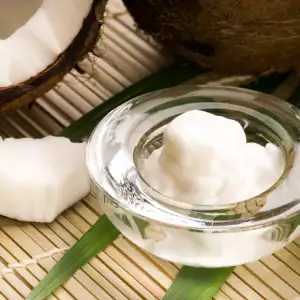
Composition of coconut oil
Coconut oil consists of 90% raw saturated fat that is in the form of medium chain fatty acids, as already mentioned. These fats keep your immune system strong, affect the thyroid gland, the skin and provide quick energy. Coconut oil is a record holder in containing lauric acid, which is not found in such large volumes in any other oil. It is logical that coconut oil is a powerful antioxidant that rejuvenates the body and reduces the need for vitamin E.
The composition of coconut oil is between 86.5 - 90% saturated fatty acids, 5-6% polyunsaturated fatty acids, 1.5 2% monounsaturated fatty acids. 45% of its composition is lauric acid, 17% - myristic acid, palmitic acid, 8%, 8% - caprylic, 7% - and 5% karponova - stearic acid.
In 100 g of coconut oil contains: 862 calories, 100 g fat, 0 g carbohydrate, 0 g protein
Quality and benefits of the coconut oil are retain when it is refined, cold pressed without dyes and contains no hydrogenated oils and hexane.
Types of Coconut Oil
There are mainly four varieties of coconut oil:
- Natural, unrefined coconut oil, which is extracted from fresh coconuts;
- Refined coconut oil in which copra (dried coconut inside) is refined, it is colorless and does not smell;
- hydrogenated coconut oil, which is made through a process for high melting points. For this, however, saturated fats increase, which increases the chance of formation of harmful trans fats ;
- Fraction of coconut oil, which is parts of coconut oil, which are separated with residual long-chain fatty acids, which in turn makes it even healthier. This receives caprylic and capric fatty acids. It is more resistant to heat treatments and can be used for frying and baking.
Selection and storage of coconut oil
It is generally considered that the highest quality coconut oil is from the Philippines and holds a quality standard of "A". Virgin coconut oil is best for cooking or baking, while fractionated is appropriate for frying. Hydrogenated coconut oil must be avoided, because it is just like any other hydrogenated fats. When you buy coconut oil, be sure to read the label of what content it has or whether it is noted that it is a pure and organic product. Always choose organic and Non-hydrogenated types. It is best to store coconut oil in a cool place, tightly closed, and its durability is up to two years. Keep the oil at temperatures of up to 25 degrees.

Cooking with coconut oil
Coconut oil has long been known as a culinary ingredient in the tropics. In most countries in this area, it is an integral part of the traditional cuisine, but its popularity spread throughout Europe much later.
However, it should be clear that oil from coconut crust should be consumed in moderation, because too much is harmful. You can take up to 2-3 tablespoons of coconut oil as an ingredient of foods, beverages or simply for eating. Coconut oil is an excellent complement to cocoa and cocoa products and is used a lot in pastry and chocolate desserts.
Coconut oil is a healthy alternative to butter and olive oil and any other oil with which you cook. Allows heat to 180 degrees and does not form trans fats. This type of fat is great for vegetarian cuisine, it is a component of various sweets, candies and raw chocolate truffles, among others. With coconut you can prepare very nice fruit and milk shakes. Of course, you can prepare different dishes with salty coconut oil - with chicken, pork, duck, lamb, beef and vegetable dishes.
Benefits of Coconut Oil
Coconut oil is known as a helper in maintaining youth and beauty, but it has a lot of healing properties. If you take preventive coconut oil, it will improve your digestion and boost your metabolism, which in turn may even lead to weight loss and overall strengthening of the body.
Coconut oil helps with hypoglycemia, but it also has antiviral and antifungal properties. Scientists claim that coconut oil treated with special digestive enzymes prevents proliferation bacteria. This oil kills pests invisible to the human eye too.
Healthy fats from coconut also control cholesterol levels in the body by increasing good cholesterol and reducing bad. This automatic risk of heart disease drops dramatically. There is evidence that certain fatty acids in coconut oil kill bacteria and help Candida candidiasis and good digestion, healthy fats in coconut oil with their antibacterial properties help to control parasites and fungi that cause indigestion and digestive problems, such as irritable bowel syndrome.
Simultaneously, these fats help us to have better absorption of vitamins, minerals and amino acids. Coconut oil affects your thyroid function. With all these useful properties, while the coconut oil causes muscle mass to move, weight loss occurs. It is ideal for massages, because it has the ability to slightly cool the body, relieve joint pain and relax muscles and nerves.
You can treat abrasions and wounds with coconut oil and it will form a thin filter that protects from dust and other bacteria. A sore will heal much faster if you treat it with the fat of the coconut.
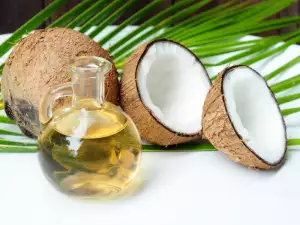
Beauty with coconut oil
Did you know that coconut oil has been used by people not only as food but also to maintain youth and beauty longer for centuries. This gift of nature is suitable for the care of skin and hair. And if you have any concerns about it, we have to note that coconut oil is easily absorbed and leaves no annoying greasy residue.
Your skin stays hydrated completely because oil keeps moisture Applied to hair, it makes it extremely soft and warm to the touch. Therefore, you can include coconut oil in all hair masks that you prepare. Such a mask is made with 1 tablespoon coconut oil, 1 egg yolk and a little alcohol. Apply the mixture evenly over the hair and after it is taken in, flush with a gentle shampoo.
If you want to get a nice tan, forget the expensive sunscreen milk and oil, which have quite dubious composition. In this case coconut oil can benefit you. To get an even and deep tan, anoint with coconut oil. This natural oil moisturizes the skin and retains moisture for a long time, but it also allows the sun to penetrate deeper and get a nice even tan that lasts for a long time.
As a bonus you can say goodbye to the hassle of peeling skin after burns. Coconut oil has the ability to naturally protect your epidermis from the harmful effects of sunlight. Combine it with sunscreen or even use it to replace your face creams. In summer and winter coconut oil will help protect your skin from weathering.
It has been shown that coconut oil is a loyal sidekick in fighting wrinkles. If you regularly anoint with it, it will help ease recovery in places where your first wrinkles have already appeared. At the same time, your skin will be hydrated, protected, and have a healthy look.Coconut oil, together with cocoa butter are probably the strongest fighters against ugly stretches on our skin.
Applying coconut oil on clean skin in problem areas will help to permanently erase unpleasant cracks on the skin. In this vein, coconut oil is virtually a mandatory product for pregnant women, whose skin undergoes changes while they have a growing belly, which is normal for every expectant mother carrying a child.
Coconut oil can help prevent chapped hands and heels. You can rub it and massage gently all over your body - face, neck, chest, abdomen, love handles, the butt, thighs, calves, heels and soles. You can use coconut oil as a bleaching agent for teeth and toothpaste, hair conditioner, cleansing lotion, make-up, lip balm and massage lotion.
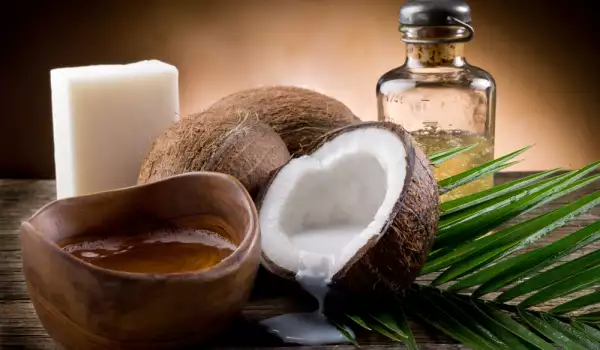
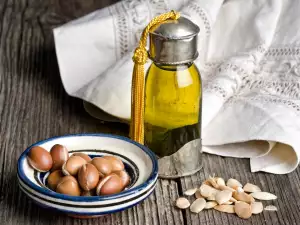

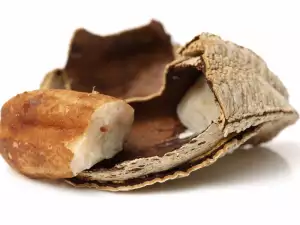
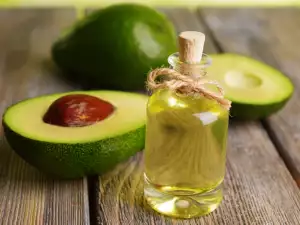
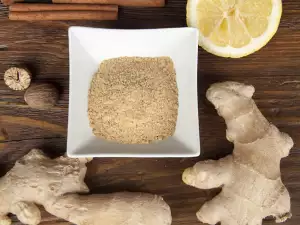


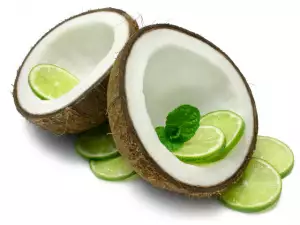
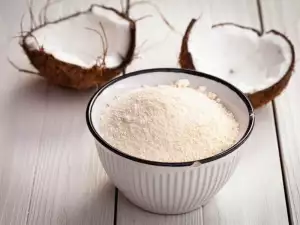

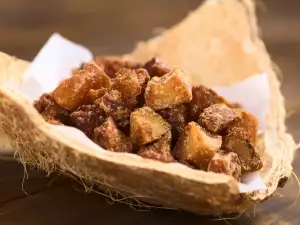


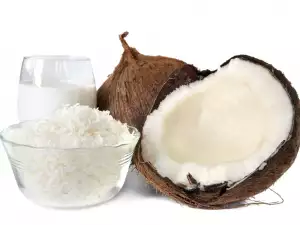




Comments